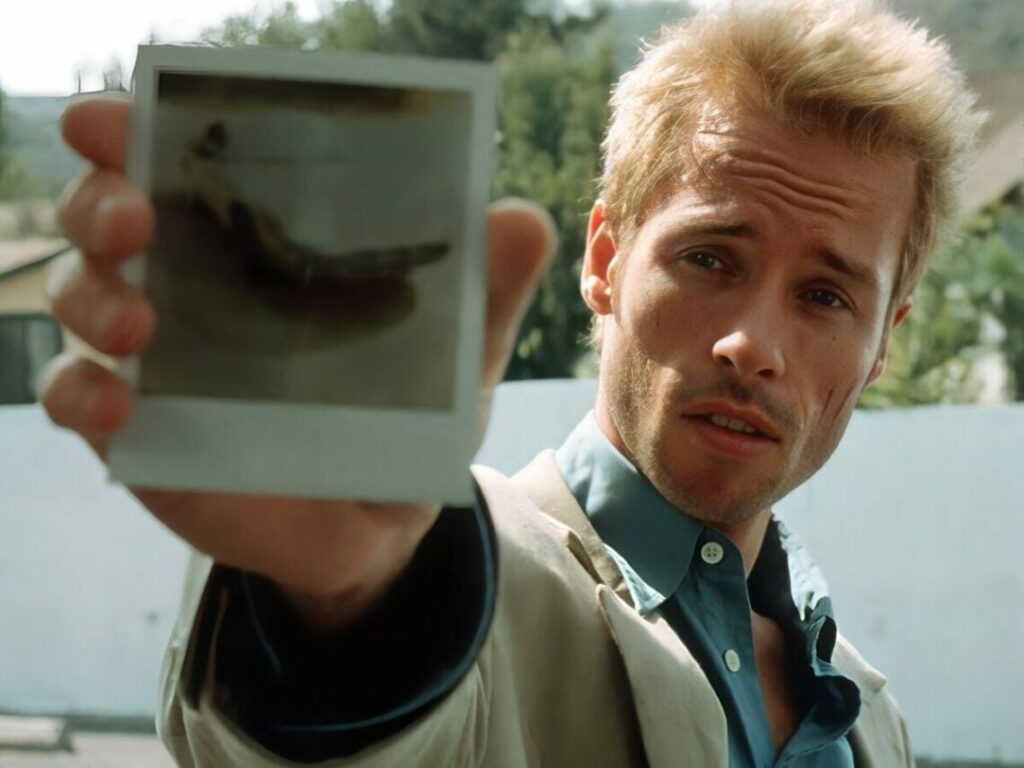Christopher Nolan remembers the movies that inspired ‘Memento’
 Posted On
Posted On
(Credit: Newmarket)
It was in Christopher Nolan’s second film that the blueprint for the rest of his career was revealed – an auteur unafraid of mainstream appeal, with an appetite for twisty narratives, enigmatic leading men and a pressing desire to play around with time. But while the memory acrobatics of Memento set the mould for every Nolan movie to follow, there’s a list of films that, in turn, inspired the 2000 movie and began the palindrome of Nolan’s style that currently ends with ‘Best Picture’ winner Oppenheimer.
In conversation with Filmmaker Magazine, Nolan, alongside his brother and collaborator Jonathan, talked about the genesis of Memento and the movies that informed Leonard Shelby’s film noir-tinged voyage from clarity into mystery. High on the list of influences is the visionary Nicolas Roeg, who Nolan called a “very experimental filmmaker working within a mainstream context” – a label that would one day come to accurately describe himself. Nolan singles out the identity-blurring antics of Mick Jagger and James Fox in 1970’s Performance in particular.
Echoes of the film can be felt in Memento, where the tropes of hard-boiled crime cinema (a down-on-his-luck protagonist seeking to “know thyself”, shifting points of view) are wielded to strip away layers of identity in an attempt to discover what lies within. That’s a trick Roeg pulled off in circus act style later in The Witches, where Angelica Huston hides her grisly true visage behind a literal mask.
Despite not having had the chance to direct anything expressly aimed at children yet, Nolan has still found a way to unmask his characters constantly – sometimes literally, as Bruce Wayne peels off his other self in Nolan’s Batman trilogy, or more figuratively, as in Oppenheimer, where a central engine of the film is an exposure of the lead character’s tortured inner life. But it’s Memento where the self-realisation is at its most uncomfortable and bracing, as Guy Pearce’s Leonard begins to grasp his own life is a series of self-directed violent crusades and himself a spoke stuck on a spinning wheel.
Another film Nolan mentions that matches perfectly with that aspect of Memento is Sidney Lumet’s 1973 neo-noir, The Offence. It’s a film where Sean Connery plays a police officer haunted by his own capacity for violence and depravity, who, in the course of a single night, is forced to come to terms with the internal decay he had hidden from himself for decades.
The horror of self-realisation is a recurrent theme in Nolan’s list of Memento influences, rounded out by John Boorman’s 1967 thriller Point Blank. “Though I have to admit that I’ve only just recently seen it for the first time — John Boorman’s Point Blank is filled with identity issues surrounding the main character that are just fantastic,” he said. It’s a film with its own fair share of ready comparisons to the Nolan oeuvre, as the Lee Marvin-played lead comes to the terrible realisation that what he thought was his own true desire was the manipulation of a mysterious and powerful organisation.
Like Leonard Shelby and so many Nolan characters after – think the protagonist of Tenet, Cillian Murphy in Inception, even Matthew McConaughey’s spaceman in Interstellar – he is forced to reckon with the fact that he is little more than a puppet being tugged around on so many strings. And it’s an idea that the ultimate puppeteer of these characters, Nolan himself, appears to have no choice but to keep returning to.
[embedded content]
Related Topics


